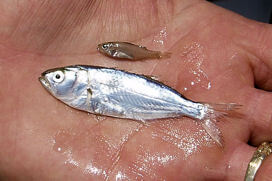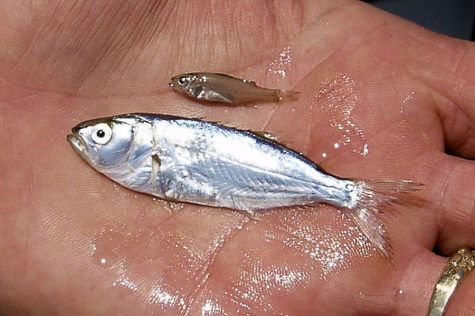BATON ROUGE – Warmer water means smaller fish, a new study finds, which could mean smaller paychecks for many Atlantic and Gulf of Mexico fisherman.
The little silver fish known as menhaden — which National Geographic has called “arguably one of the most important fish in the sea”— has shrunk in average size by around 15 percent over the last 65 years according to the Louisiana State University study. This size change in the menhaden could mean big problems for those who earn their living from fishing it, as well as the large ecosystems the menhaden support.
Accounting for about one-half of the fish harvest in the Atlantic and Gulf of Mexico, the shrinking menhaden appears to be changing size in direct correlation to the warming climate.

“These changes are closely related to variations in the annual air temperature, which we used as a proxy for water temperature, for fish on both coasts,” says study author Eugene Turner in a press release. “As the Earth’s atmosphere and oceans continue to warm, the future of menhaden, it seems, will be even smaller.”
The discovery could have a significant impact on wildlife, too. Menhaden are also a major food source for birds, seals, whales, and striped bass, among other animals. As their shrinking mass affects entire food webs, the economic impacts could increase even further.
According to the National Geographic article on the importance of menhaden, the catch limits on these fish have been subject of wide debate. While conservationists have warned that menhaden over-fishing may affect the larger animals that rely on them as a food source, industry interests have continued to pressure for larger catch limits.
The company Omega Protein plays an outsize role with its 85 percent share of the coast-wide allocation. Accordingly, the company was pleased when the Atlantic States Marine Fisheries Commission (ASMFC) increased the annual harvest quota by 6.45 percent for 2017.
With Omega Protein having today entered into a definitive agreement to be acquired by seafood giant Cooke Inc., a new variable has been added to the picture. Just how Cooke’s acquisition of Omega Protein affects the future of the menhaden fishery remains to be seen.
While Turner’s research acknowledges the importance of the fishing industry’s impact on menhaden, he says it is secondary to the effect of warming temperatures.
“The effect of the fishing, if present, can be reversed, whereas the consequences of temperature changes are permanent for now, and anticipated to increase,” he says in the research paper.
The weight and length changes of the fish were calculated in the study using data collected by the National Marine Fisheries Service.
The research comes amid other recent fish studies detailing newly discovered effects of noise pollution on seabass and gobies, which could also have implications for the fishing industry.
The full study was published last week in the journal GEO: Geography and Environment.

Bull!
I may be a bit cynical as to the results of a study by LSU blaming the existence of smaller menhaden due to warmer ocean water. My “kneejerk” reaction is to roll my eyes and assume this is another attempt to further the Leftwing’s attempt to sell their “manmade global warming” scam. However, since ocean temps can be effected by cyclical atmospheric and geological occurrences (such as the absence of sun spot activity or a “Solar Minimum” and the author of the article did not directly blame the findings on “manmade global warming” I can’t be to accusatory of the article being more political rather than scientific. There is, though, other possibilities that could cause this specie of fish to the be growing smaller that are not addressed in the article. An example might be the food source for this specie of fish, Is its food just as plentiful and nutritious as in the past, etc? If not, would that not be a possible cause of smaller fish? I’m simply saying that warming sea water is not, of and by itself, a convincing conclusion.